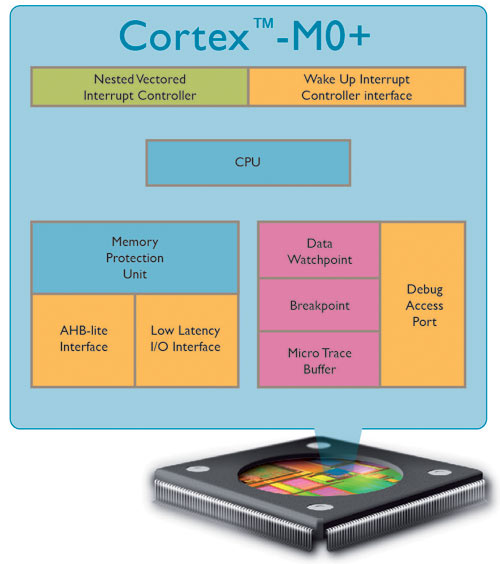ARM Releases "World's Most Efficient Processor"
ARM today announced a new low-power processor, the Cortex-M0+, which the company claims is "the world's most energy-efficient microprocessor".
Get Tom's Hardware's best news and in-depth reviews, straight to your inbox.
You are now subscribed
Your newsletter sign-up was successful
According to the IP provider, the chip is designed to be used in home appliances, white goods, medical monitoring, metering, lighting and power and motor control devices to deliver an "ultra low-power" of 9µA/MHz on a 90nm LP process.
The Cortex-M0+ fits into a new product trend that is generally referred to as the "Internet of Things", which describes an environment in which simple devices are wirelessly connected to each other and can provide communication, management and maintenance capability. ARM imagines its new processors to be used in applications ranging from "sensors to wirelessly analyze the performance and control of domestic or industrial buildings, to battery-operated body sensors wirelessly connected to health monitoring equipment."
ARM said that the new 32-bit chip, which builds on the platform of the Cortex-M0, consumes only one third of 8-bit and 16-bit processors that are used in the application field targeted by the processor. Developers can use the ARM Keil MDK to compile and debug 32-bit applications for the chip. According to ARM, early licensees of the Cortex-M0+ chip include Freescale and NXP.
Get Tom's Hardware's best news and in-depth reviews, straight to your inbox.

Douglas Perry was a freelance writer for Tom's Hardware covering semiconductors, storage technology, quantum computing, and processor power delivery. He has authored several books and is currently an editor for The Oregonian/OregonLive.
-
Soda-88 never thought i'd see a 90nm cpu be considered the most energy efficient in 22/28nm eraReply -
kcorp2003 Soda-88never thought i'd see a 90nm cpu be considered the most energy efficient in 22/28nm eraReply
true but considering it uses a 1/3 of the power of a 8bit chip is sweet. -
Tab54o Home appliances? I dread the days when our microwaves, toasters and coffee makers have lan ports or wifi cards and operating systems.Reply -
esrever Soda-88never thought i'd see a 90nm cpu be considered the most energy efficient in 22/28nm eramakes you wonder what a 22nm chip like this will be like. Maybe it will be able to run on less than 0.1w of power.Reply -
-Fran- Tab54oHome appliances? I dread the days when our microwaves, toasters and coffee makers have lan ports or wifi cards and operating systems.Reply
Well, by strict definition, everything with a chip has an OS... And well... Samsung already has several appliances with WiFi :P
Cheers! -
dudzcom esrevermakes you wonder what a 22nm chip like this will be like. Maybe it will be able to run on less than 0.1w of power.Reply
I'd bet $10 your microwave is running unix right now. -
dudzcom Reply9µA/MHz
Since when is Amps a measure of energy? Energy is measured in JULES. If you're gonna give amps, at least give voltage too.
